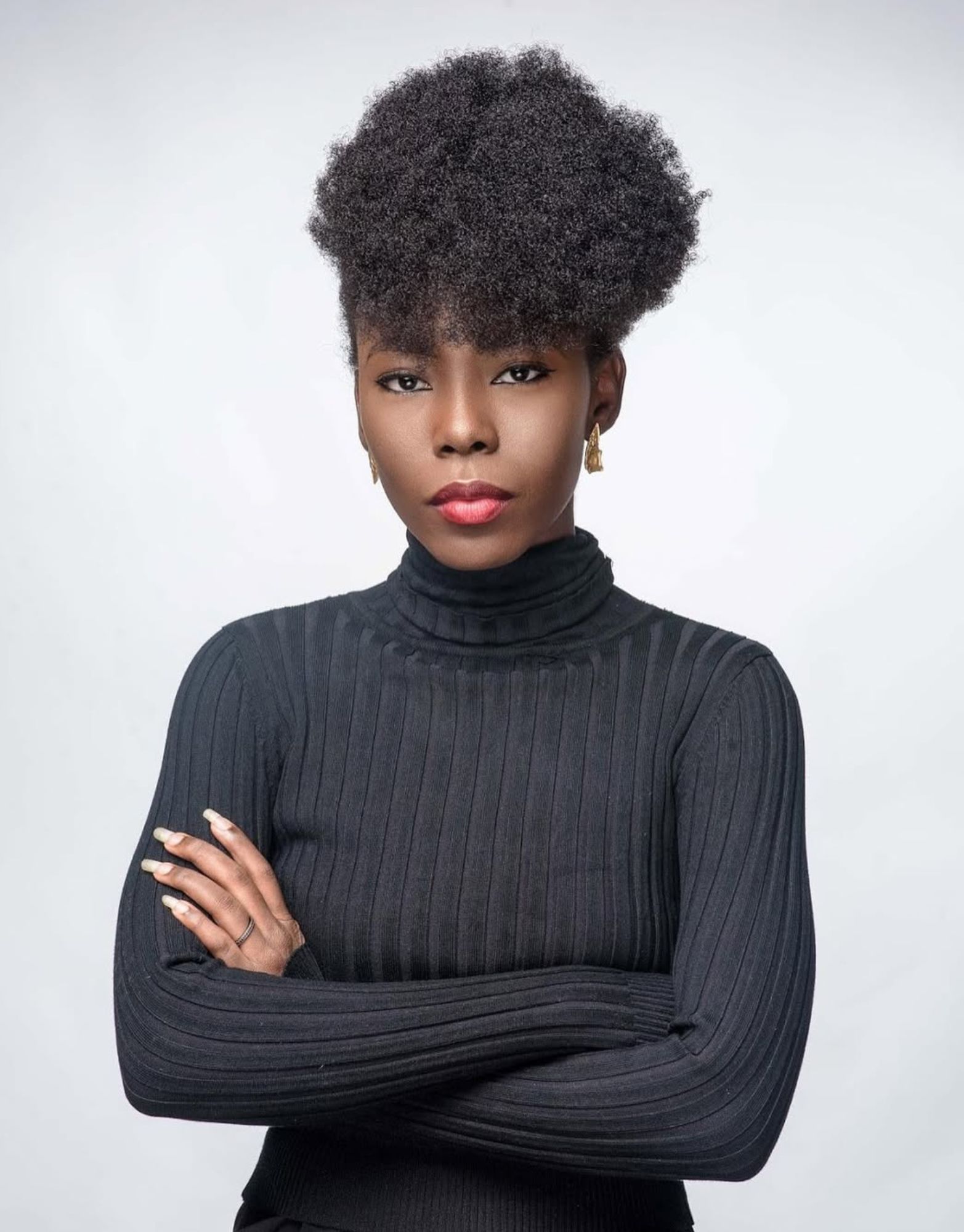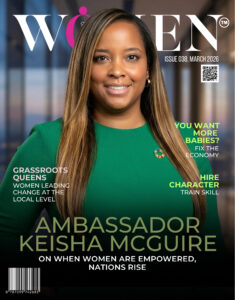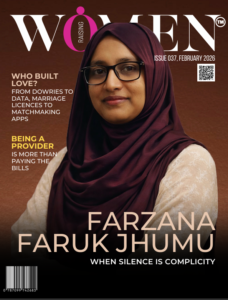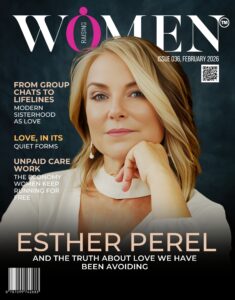From a Questioning Child to a Catalyst
By Oluchi Obiahu
Blessing Abeng discussed her journey from aspiring to be a neurosurgeon to a career in branding and communications. A curious child turned visionary leader, she has carved a path from dreaming of neurosurgery to becoming a powerhouse in branding, communications, and the tech ecosystem. Her interest in business plans and marketing led her to explore branding, which she later studied. Abeng emphasized the importance of curiosity, resilience, and collaboration in her career. She highlighted the significance of maintaining personal values, staying transparent, and leveraging mentorship. Abeng advised focusing on progress and learning from failures, and stressed the importance of asking for help and giving back. Blessing’s words stir women everywhere to honour their voice, build meaningful wealth, and stay grounded while influencing at scale. In this exclusive interview, Blessing opens up about her journey, fixed in an insatiable curiosity, a commitment to transparency, and a passion for democratizing opportunities.
Q. Before everything began to piece together, who were you? What were your early dreams, fears, or questions about the future?
A. The question about who I was is pretty complex because I don’t remember everything, but what I do know and recall are the things I was curious about. I was generally a questioning child. I had the kind of childhood where I consistently asked questions, seeking to know more. And I have to give a big shout-out to my parents for encouraging that because they never stopped us from asking questions. If something was on my mind or I didn’t understand something, I would ask, and I was allowed to ask. This curiosity was evident in my life in general. I grew up as a curious child. I liked to know things. I liked to read books that were above my level. To put it simply, I just loved to read, explore, and see the world. I was really curious and always the person who would ask a million questions in class. That was the kind of child I was.
All I dreamt of at the time was being a medical doctor because I wanted to save lives. As I got older, I wanted to be a neurosurgeon, specializing in brain surgery. That was really it in a nutshell. But as I grew up, I noticed that we didn’t even have enough brain doctors in Nigeria at the time, they were in the single digits, and I wanted to change that.
Q. What inspired your shift into branding, communications, and the tech ecosystem, and what kept you going even when it got hard?
A. That’s two questions, so let me address them one at a time. First, what inspired the shift? As I mentioned earlier, I was set on becoming a doctor. I wanted to travel abroad to study surgery. But when I finished Senior Secondary School and it was time to pick a university, my dad felt I was too young and I looked too tiny to travel abroad for such a long program. Becoming a surgeon meant first learning to be a medical doctor, then practicing, then becoming an attending, and only then specializing in a surgical field like neurosurgery. It was a long journey, and neurosurgery wasn’t taught in Nigeria, so I’d have to go abroad. I could have started medicine in Nigeria, but my dad wanted me to get the full experience abroad to gear me toward my goal. However, he wasn’t comfortable with me leaving at such a young age, so he suggested I build values at Covenant University.
Covenant University didn’t offer medicine, so we had to find a pre-medical course. We landed on biochemistry not because I knew anyone who had studied it, but because it was one of the pre-medical courses available. It had a good mix of biology and chemistry. I always joke that I should’ve noticed the chemistry part was longer than the biology, but that’s what we chose. So, I ended up studying biochemistry at Covenant University.
During my studies, I had an Industrial Training (IT) period where I worked at organizations to see what my pre-med course could lead to. I worked at a virology institute and a pharmaceutical institute focused on phytomedicine. At the virology institute, I had to collect viral loads from HIV patients. That’s when it hit me, I’d always thought about saving lives, but I hadn’t considered what would happen if I lost a life.
In surgery, losing a patient is inevitable, and I started to question if I could handle facing a family and saying, “I’m so sorry, we tried, but it wasn’t successful.” That wasn’t something I felt comfortable confronting. It gave me a new, profound respect for medical doctors because losing a patient is not easy.
So, I started exploring other ways to “save lives.” Did saving lives only mean one thing? I dug deeper, asking myself questions. One day, back at school, I joined a club where we had to write proposals. I think we were asked to do a one-page proposal, and my team won the pitching session. I’d never written a proposal before, so that was my first experience, and it sparked something. I taught myself how to write business plans, which was gruelling but worth it. People started coming to me, paying me to write business plans for them, and they always highlighted my marketing plans as their favourite part. They’d say, “Oh my God, your marketing plan was amazing!” That stood out to them.
Looking back, I realized we’re all saving lives in different ways. A farmer grows food so a doctor can eat and do their job. Pharmaceuticals rely on crops to extract medicine. Everyone’s contribution matters, and we all work together to make life happen. That was such an eye-opening realization for me. Then, a friend walked up to me one day and said, “Blessing, what you’re doing is branding. You’re mixing business and strategy in a creative way.” I googled it, and at the time, branding wasn’t very popular, but it caught my interest. I decided to study it, and that’s how I ended up in the branding world.
Now, what kept me going? Different things at different times. Sometimes it was the drive to learn. Early on, I was curious about what multinationals knew that I didn’t. That inquisitive nature pushed me to work with agencies and multinationals to find out. Then I started thinking about small businesses. Multinationals spend big money on top talent for their communications, but how could small businesses compete? They often don’t have the resources or know to prioritize this. So, I created my own agency focused on tech for small businesses, and that kept me going for a long time.
Later, my partner suggested building a community to add value to the tech ecosystem. That’s where I met the co-founder of the tech company I eventually co-founded and built. The drive to acquire customers and grow, even without backing, was so strong, it kept me going. After that company was acquired, I co-founded a tech nonprofit, driven by the desire to help people. I saw the challenges tech founders faced, people with talent who just needed opportunities. My goal was to democratize access to tech and train people. So, different things kept me going at different points, but they’re all connected by my curiosity and desire to help.
Q. You’re leading in spaces that are largely male-dominated. How do you maintain your voice, visibility, and values in those rooms?
A. Gender doesn’t really affect how I use my voice or maintain my values. To me, my values are my way of life. Irrespective of where I am, who’s around me, or the environment, my values don’t change to conform to my surroundings.
Early on, I had to decide what those values were: What matters to me? What would I never be caught doing, no matter how much life pushes me? What do I stand for, and what do I not stand for? Having that clarity was helpful, whether I was in a specific industry, space, village, or country, it didn’t matter. This also shows up in my personal life and friendships. My values are my values.
For example, I don’t like injustice. When I see people consciously devalued or undermined without regard for their rights, it stresses me out. You’ll often find me in those conversations, trying to figure out how to bridge the gap. This is clear in a lot of the work I’ve done. As for maintaining my voice, I think it’s about using it. You only find or keep your voice by speaking up. If you’re not using it, I don’t know how it’s going to stay strong or happen miraculously. I don’t plan to speak up in specific scenarios or pick topics in advance. I just focus on things that align with my values, things I care about, or decisions I made early in life.
One of those decisions is that I don’t care too much about the spotlight, but I’m happy to be a catalyst so others can use me as a ladder to reach their next level. That doesn’t mean letting people take advantage of me, it means I won’t be the only woman, Nigerian, or whatever in a room. If I find opportunities where others like me can thrive, I’ll open doors for them. If there’s knowledge I struggled to gain or came across easily, I’ll share it with anyone who needs it. That guides my decision-making process.
As for visibility, when you focus on adding value to people, visibility finds you whether you like it or not. I always tell people: don’t chase fame. Be visible where it matters to you. Speak up in the rooms that matter to you. Don’t let fear or shyness stop you; don’t let those be the reasons you stay silent. If you choose to hold your tongue, let it be a conscious decision, not out of fear. That’s always been helpful for me. I also collaborate a lot with different people and organizations, which has led to visibility through their shared audiences. That’s about it.
Q. Many young people today want their ideas to succeed instantly, skipping the process and expecting overnight success. What would you say to a woman who’s struggling with the wait, the work, and the slow build?
A. I’ll try to answer this as informally as possible. I recently heard someone on a podcast say that success and failure aren’t just bold outcomes tied to your projects. Success will always happen, and failure will always happen. I also listened to Naomi Campbell on a MasterClass, where she said that to get opportunities, you need to put yourself out there, but you won’t get 100% of the opportunities you pursue. So, instead of focusing too much on the waiting, the failures, or the things that push you down, recover quickly from setbacks. And here’s my own advice: when you need a break, take it. Needing a break is different from wanting to give up. Create systems to keep yourself healthy, strong, and re-energized, because life will always have things that drain your energy and things that give you energy. Try to find a balance between them.
I know it’s tough, I’m recognizing how difficult it is even as I say this. There are times when you’ll have spikes of work or energy. Right now, as I’m speaking to you, I’m in a spike of work, focusing on specific goals I’m trying to achieve. When I wrote my goal-setting book a couple of years back, one of the biggest eye-openers was realizing that accomplishment-type goals aren’t the only kind of success. Progress is success, too. Overcoming something? That’s success.
Finishing something? That’s success. Learning something new you’ve never done before? That’s success. We need to redefine what success means and stop comparing ourselves to others. When you compare, you don’t know their journey or their goals. You’re comparing your apples to their oranges, and that puts you in a tough spot.
Another thing: the goal of an experiment isn’t to be right but to discover. Most things in life are experiments. If you approach your work thinking, “I’m just experimenting with this, it might not work, but I want to see,” it gives you a whole new energy and approach to life. Focus on the problem you want to solve, the things you care about, the value you want to add, and the lives you want to improve. You’ll find different ways to express that. Some things won’t go your way, and that’s fine, some will. Surround yourself with a community that cheers you on and reminds you who you are, because there’ll be days when you forget. If you’re an introvert and don’t want a big crowd, that’s okay. Find your close circle where you can be your full self. Or, if you prefer, create a “happy filing system”, record voice notes, journal, or write things to remind yourself of what you’ve accomplished, not just work-related stuff. That helps you prioritize and see life differently.
My final advice? Always ask yourself: If I were going to die in a year, what would I do differently? If I had three months, what would I prioritize? That’s my moral compass for life. It helps you see what’s truly important and what’s not. You have limited time and energy, put it where it matters most. Yeah, that’s it. Thank you.
Q. How important has mentorship, both in giving and receiving, been in your personal growth?
A. For me, it’s hard to pinpoint exactly how mentorship has shaped me because I haven’t approached it in the usual way. I rarely had people holding my hand, calling every two weeks to guide me. Instead, I’ve had different people at different phases of my life, what I call my “board of advisers.” Some are my friends, some aren’t overly accomplished, and some are very accomplished. I’ve learned from listening to their interviews, reading their books, or asking them one question via a voice note. Rather than framing it as traditional mentorship, I see it as asking for help and asking questions. That unlocks the most important things.
I was telling my husband recently that we underestimate the power of information flow. This world operates on brokering information, access to it makes all the difference. It’s how an investor knows to put money into a business that could multiply their investment. If you don’t know a concept exists, how can you invent something based on it? Acquiring information is crucial and being humble enough to admit you don’t know everything is just as important. One of my favorite things to say this year is, “I don’t even know what I don’t know.” So, I’ll ask someone, “Based on your experience as a subject matter expert, are there things I’m not thinking about that I should be?” That question has unlocked so much help.
I have no problem asking for help or admitting I don’t know something. I’ll dig for information, ask questions, and learn from anyone, even a child. Last month, I was in a conversation with a nine-year-old, learning about a tech tool, and I was like, “Oh my God, there’s so much we don’t know!” We think we know, but we don’t. So, don’t be afraid to ask for help or information from people you perceive as above you, below you, or your peers. You can learn from anyone, from unexpected places.
If you need someone to hold you accountable, decide early on who that should be. Is it a friend you can talk to easily, or someone you hold in high regard, where your respect for them pushes you to follow through? You might even use multiple strategies for different things. The most important thing is to keep the promises you make to yourself. Don’t be scared to ask questions or seek help. But also, don’t always be the one taking. As much as you take, give back. You can’t always be the one who’s ignorant, set yourself up to learn so you can also contribute. That’s how I’d answer that.
Q. What values or mindsets have helped you stay grounded while building, leading, and influencing at scale?
A. I can easily talk about this. Transparency is really important to me, it’s something I don’t take for granted. You can see this in some of the businesses and products I’ve built. I also prioritize empathy over everything else sometimes. Curiosity is so important, too. I have no problem being curious, learning new things, and understanding that I’m not always right. I don’t know everything, and it’s nice to ask questions, to wonder. There’s a beauty in wondering that I always find grounding. As I’ve said before, injustice stresses me out. So, in situations where I can bridge the gap, provide access, or democratize information and opportunities, you’ll find me there. That’s what keeps me grounded.
IQ. What message, mantra, or mindset would you offer to women everywhere on how to honour their words, build meaningful wealth, and safeguard their overall well-being?
A. That’s a masterclass question! Let me start with building wealth. I often talk about how we put so much pressure on individuals to build wealth, but we don’t talk enough about how governments and societies contribute to wealth-building for women and everyone. For example, if I’m in a country where the roads aren’t bad, my car will last longer, and I’ll spend less on repairs. Everyone says, “Invest, get passive income,” and that’s great advice, but how do I even maintain the money I have? My one piece of wisdom would be: ensure the things that matter to you. If something is important, protect it by insuring it. That way, you have peace of mind. If it breaks, gets stolen, or fails, you know its financial equivalent will be returned to you. So, if it matters to you, insure it.
But the one thought I’d like to leave everyone with is this: if you’re in the room, you deserve to be there. Don’t waste time wondering, “Oh my God, should I be here?” That self-doubt will always creep in, but catch yourself and say, “I’m already here. Asking why I’m here is a waste. What’s more useful is: What do I do now that I’m here? How can I add value in this moment?” Focus on the value you can bring right now, not on whether you should be in the room in the first place. That’s it.
Thank you!
HIGHLIGHTS
“My values are my way of life. Irrespective of where I am, who’s around me, or the environment, my values don’t change to conform to my surroundings.”
“You only find or keep your voice by speaking up. If you’re not using it, I don’t know how it’s going to stay strong.”
“I don’t care too much about the spotlight, but I’m happy to be a catalyst so others can use me as a ladder to reach their next level.”
“Progress is success, too. Overcoming something? That’s success. Finishing something? That’s success. Learning something new you’ve never done before? That’s success.”
“If you’re in the room, you deserve to be there, don’t waste time wondering, ‘Should I be here?’ … What’s more useful is: What do I do now that I’m here? How can I add value in this moment?”
“Don’t be afraid to ask for help or information from people you perceive as above you, below you, or your peers. You can learn from anyone, from unexpected places.”







